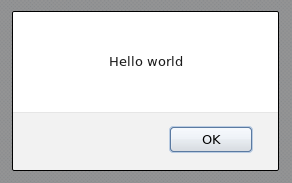C.4. Example User Interface Plug-in Deployment
Follow these instructions to create a user interface plug-in that runs a
Hello World! program when you sign in to the Red Hat Virtualization Manager administration portal.
Procedure C.2. Deploying a Hello World! Plug-in
- Create a plug-in descriptor by creating the following file in the Manager at
/usr/share/ovirt-engine/ui-plugins/helloWorld.json:Copy to Clipboard Copied! Toggle word wrap Toggle overflow - Create the plug-in host page by creating the following file in the Manager at
/usr/share/ovirt-engine/ui-plugins/hello-files/start.html:Copy to Clipboard Copied! Toggle word wrap Toggle overflow
If you have successfully implemented the
Hello World! plug-in, you will see this screen when you sign in to the administration portal:
Figure C.1. A Successful Implementation of the Hello World! Plug-in
